Many people wonder if a radar detector is worth it, but if you’ve ever gotten a speeding ticket, you already know the answer. Yes, radar detectors are worth it, especially for people who drive long distances or are always on the go.
However, many popular radar detectors can be expensive, ranging between $400 to $500. Do you really need to spend this much for a quality radar detector? No way!
Below, we’ll go over a list of the best affordable radar detectors under $200 for anyone on a budget.
If you’re just here to find out which one is the best, we recommend the Cobra RAD 480i. With its best-in-class detection range and the iRadar app, you’ll never be surprised by a speed trap again.
| Best Overall | Runner-Up | Best Budget |
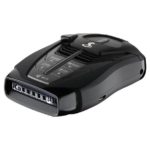 |
 |
 |
| Cobra RAD 480i | Uniden DFR9 | Cobra RAD 380 |
     |
     |
     |
| Shop Now | Shop Now | Shop Now |
| $149.95 @ Cobra | $199.99 @ Amazon | $99.95 @ Cobra |
Before we dive into the details of the best radar detectors under $200, let’s take a quick look at what makes a radar detector good in the first place:
Affiliate Disclosure: We may earn a small commission on some of the products you purchase below. This does not affect our rankings in any way and comes at no additional cost to you.
What to Look Out For in a Good Radar Detector
Before you can choose a good radar detector, you have to know what to look for. Here are the features to keep in mind while you shop.
Long Range Detection
Detection range is crucial because it determines how much time you have to slow down. If you have a radar detector with a short range, you may not have enough time to slow down before a police officer is already clocking your speed.
Territory range is one of the most important factors to consider when choosing a radar detector. Some of the top-of-the-line models can detect radar from miles away. Our top pick, the Cobra RAD 480i, has a range of up to two miles on flat, open roads.
Multiple Band Detection
Radar detection works by detecting the electromagnetic wave emitted by a radar speed gun. Speed guns use multiple bands, so for a radar detector to be as effective as possible, it should be able to detect common bands.
The three most popular radar bands police use in the U.S. are X, K, and Ka. At the very least, your radar detector should detect those bands. We go into more detail about radar band detection in the FAQ section below.
Laser Detection
Radar was the go-to for catching speeders for a long time, but radar detectors made it less and less effective. Radar waves are wide and can bounce off other cars. They don’t work as effectively if there are hills, buildings, or heavy traffic in the way. So, police started using lasers, which are much narrower and precise. Many of the products we recommend below, such as the Cobra RAD 480i, offer laser detection as well – definitely something you want to consider before you purchase.
Smartphone Connectivity
Smartphone connectivity is not essential, but it’s one of the newest features of radar detectors and a way to take things to the next level. Some radar manufacturers have their own apps available for iOS and Android devices. If you’re in the market for a radar detector, we recommend getting one with smartphone connectivity, as it allows you to share alerts with other people on the app. These alerts are important as it shares red light cameras, speed traps, GPS data, and much more! Smartphone connectivity allows you to get the most out of your radar detector.
GPS
Radar detectors with GPS use satellites to measure your speed, location, and the direction you’re traveling. Not only do they let you know when radar is nearby, but they also tell you exactly how fast you’re traveling so you know whether you need to slow down or not. You can even set some of them to warn you if you’re traveling over a certain speed.
A significant advantage to having a radar detector with GPS is that it can remember areas that you’ve traveled through before and warn you of sudden changes in the speed limit. You can also program in the locations of red-light or speed cameras.
#1: Best Overall: Cobra RAD 480i
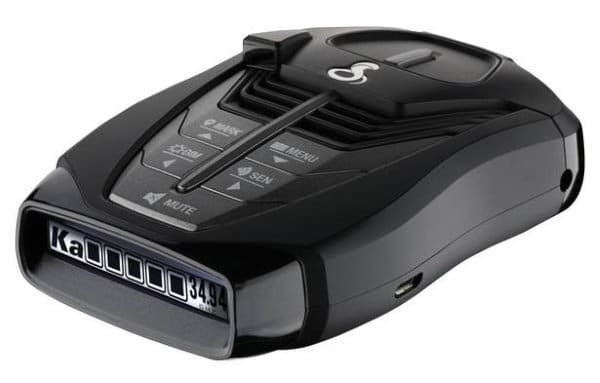
Pros
- Long-range radar and laser detection
- Bluetooth Connectivity and iRadar app
- OLED Display
Cons
- False alarms
- No directional indicators
Not only is the Cobra RAD 480i super affordable at only $149.95, but it’s also known for its sleek, modern look. It’s also one of the best high-performance radar detectors under $200 on the market. The bright OLED display is easy to read, and the band identification is easy to identify on-screen. There are no directional arrows, but you can easily read the radar’s strength using the numerical signal meter.
The design is pretty straightforward and easy to use. One of the best things about this radar detector is its range, up to two miles on a flat, open road, which gives you more than enough time to slow down.
Cobra included anti-falsing circuitry for false alert filtering in this radar detector as well as blind-spot monitoring systems with the hope of reducing a false alert. It’s challenging to eliminate all false alarms unless you’re willing to pay for a top-of-the-line model. Still, by changing the sensitivity, you can often filter out the notifications you don’t need to receive.
Another great thing about this product is the Bluetooth capability, which allows you to connect to the iRadar app. With the iRadar app, you will be able to share and receive real-time alerts (like red light cameras and speed traps) from an entire network of users.
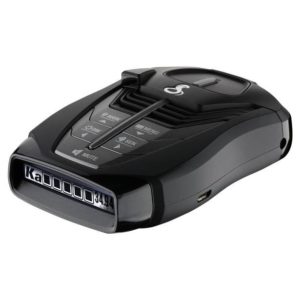
The Cobra RAD 480i is a true high-performance radar detector at a budget price. It features false alert filtering, front and rear long-range radar and laser protection, a nice OLED display, and Bluetooth connectivity paired with a highly-rated mobile app.
#2: Runner-Up: Uniden DFR9

Pros
- Multi-color OLED display
- Red light and speed camera alerts
- GPS
Cons
- Poor instructions
- Suction cup mount ineffective
Though the Uniden DFR9 is affordable compared to some high-end models at only $199, it costs a little more than our top pick. But you’re willing to spend a little more money, it’s a great one to consider.
This radar detector is sturdy, and while it doesn’t have the sleek styling of the Cobra RAD 480i, it was designed with usability in mind. The OLED screen is easy to read, regardless of the ambient light, and the display is full-color, which you don’t usually find on products at this price point.
The GPS features are useful, and it remembers your regular drives, so it doesn’t deliver false alarms from automatic door openers and the like. It includes a carrying case, a cigarette charger with a mute key, and a USB cord.
Although this radar detector claims to be super long-range, it doesn’t perform quite as well as the best overall pick, which is the primary reason it holds our number two spot.
If you’re interested in Uniden but are hoping for something a little more affordable, take a look at the Uniden DFR8. It shares many of the same features as the DFR9 but will save you around $30 off the DFR9 by sacrificing GPS, False Alert Filtering, Red Light & Speed Camera Alerts, and Speed-based Auto Mute. But if you ask us, the extra $30 is worth it for those features.
#3: Best Budget Pick: Cobra RAD 380
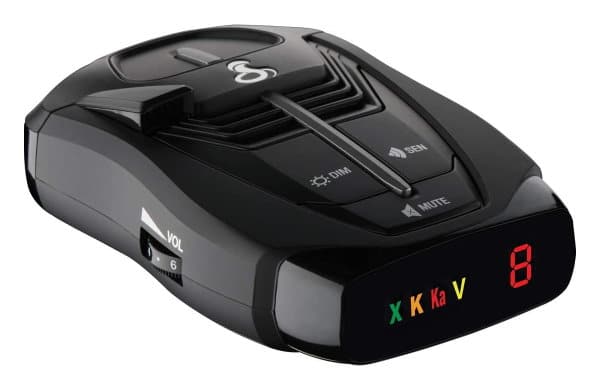
Pros
- Under $100
- Red light and camera alerts
- Updatable Firmware
Cons
- No GPS
- No Bluetooth
If you’re on a tight budget and looking for something reliable and effective, take a look at the Cobra RAD 380. For less than $100, it provides both front and rear detection and has updatable firmware, so it’s always ready with the newest technology.
The digital LCD display is streamlined and straightforward, with multiple colors that are easy to see. It’s easy to use, too, with clearly labeled buttons and an intuitive design.
The biggest things missing from this radar detector are GPS and Bluetooth capabilities. While those are great features, they’re not completely necessary to avoiding a speed trap. If you want something for basic radar protection without anything fancy, it is worth checking out.
#4: Escort Solo S4

Pros
- Cordless
- 9 programmable features
- One-year warranty
Cons
- Battery-powered; will need replacing
- False alarms
Escort is one of the most well-known brands for radar detectors, so you know it’s a name you can trust. We like that it’s cordless, which means you can take it with you from one vehicle to the next. If you travel a lot and are always in a different rental car, this is a great way to help you stay alert on unfamiliar roads.
You can also program this radar detector to suit your driving style. It also saves your settings, even when you have to take the batteries out to replace them. The bright OLED display is readable in any light, and the intuitive design is easy to use. This radar detector has multiple band and laser detection and provides long-range coverage.
#5: Escort Passport 8500 X50
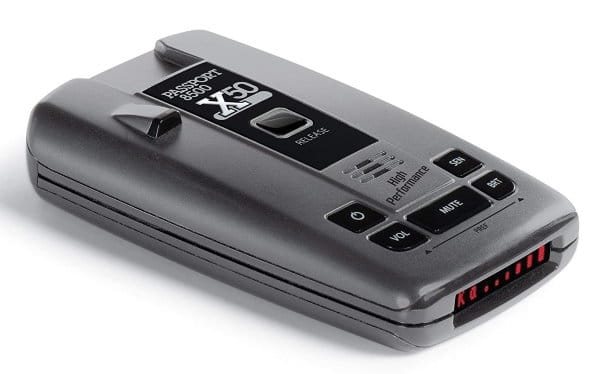
Pros
- Hand-free operation
- Automatically adjusts sensitivity
- Simple, easy-to-read display
Cons
- Not cordless as advertised
- No GPS or Bluetooth
The 8500 X50 is another excellent option from Escort. The LED display is simple and easy to read, and it tells you the band and signal strength it’s picking up, so you know when to slow down to avoid a ticket.
This radar detector analyzes incoming signals and considers your route to automatically adjust the sensitivity. It communicates clearly and supports hands-free operation so you can be as safe as possible when on the road.
This product comes with everything you need, including a travel case, windshield mount, and smart cord, so you can charge it in the cigarette lighter.
Other Helpful Tips
Power: There are generally two types of radar detectors to choose from: corded and cordless. All are great, but which one is best for you depends on what you’re looking for. Corded detectors are the most reliable. People usually mount them on their windshield, and they have the best range.
Cordless radar detectors typically run on batteries, and the biggest perk to having one is that they’re portable. Cordless radar detectors can easily be moved from one car to another, so they’re a good choice for households with multiple vehicles or someone who uses rental cars.
Display: The display should be clear and easy to read. You don’t necessarily need something multi-colored; single-color options can do just fine. But make sure the details are easy to see. If you want something that gives you more information than only the radar and the strength, prepare to spend a little more money. The best radar detectors have OLED displays, making them easy to read at a quick glance.
Upgrades: A significant benefit to getting a radar detector that’s upgradable is that you will always have the manufacturer’s newest technology. Combine this with a sturdy radar detector that’s built to last, and you can potentially use it for years.
Frequently Asked Questions (FAQ)
Are radar detectors legal?
Some people mistakenly believe that radar detectors are illegal. But in 49 states, you are legally permitted to have a radar detector in a private vehicle. (Sorry, Virginia and Washington DC.)
Federal laws ban the use of radar detectors on military bases, and commercial vehicles aren’t allowed to use them.
If you’re thinking about getting one for your personal vehicle, check your state and local laws first, just to be sure. Note that radar detectors are also illegal in most parts of Canada.
Will a radar detector drain my car battery?
If you get a cordless radar detector that runs on its own battery, you have nothing to worry about. As for corded radar detectors, they typically do not draw very much power and are unlikely to drain a healthy battery. Some cars are designed to cut power to anything plugged into the battery when you turn off the engine. Check your owner’s manual to be sure.
Should I get a radar detector or jammer?
Radar jammers are illegal, so you should definitely get a radar detector. Jammers work by disabling police radar and are banned in most places. You will still see them for sale, but we don’t recommend buying one.
Can police tell if I have a radar detector?
They can’t be sure in every case, but some highly trained police officers will be able to tell. For one, most radar detectors are mounted on the windshield, so they’re easily visible. You can’t get pulled over for this unless it is obstructing your view, so be careful where you put it.
Some police officers use devices called RDDs, or Radar Detector Detectors, which can detect the signal from your unit. Still, you only really have to worry about this if you’re using your radar detector in a state or vehicle where it is illegal.
Which radar bands should my detector detect?
Police use three primary bands in the U.S. One is the X band with a frequency of 10.5 to 10.55 GHz. This frequency was one of the first, dating back to the 1950s. Because it’s been around so long, it’s easy to detect. In an ideal environment, X band can track speeds between two and four miles away, but it’s very sensitive. For example, in extremely high or low temperatures, it has a difficult time detecting anything.
Next up is the K band, which has been used since 1978. Its frequency is between 24.05 and 24.25 GHz and is the most popular band used today. When this band was first introduced, it could only detect speed when stationary, but a pulse version was invented to be used from a moving vehicle. One big difference between the X and K band is that the K band is much shorter, and a radar detector can only pick up on it from 0.25 to two miles away.
The third band is the Ka band, which has been around since 1987. It’s made up of three other bands: Ka, Ka Wide Band, and Ka Super Wide Band. They all work at a higher frequency than the other two bands, from 34.2 to 35.2 GHz.
Some newer radar guns use frequencies as high as 36 GHz, which was an attempt to make it as hard as possible for radar detection to be effective. Luckily, the best radar detector manufacturers figured out how to sweep through multiple bands, detecting any frequency.
Conclusion
Radar detectors are extremely useful, and if you avoid one or two speeding tickets, they pay for themselves. We hope this guide helped you figure out what to look for, and don’t forget to check out our top picks.
Original article: 5 Best Radar Detectors Under $200 – A Buyer’s Guide (2021)
from Automoblog https://ift.tt/37o9fDM
No comments:
Post a Comment